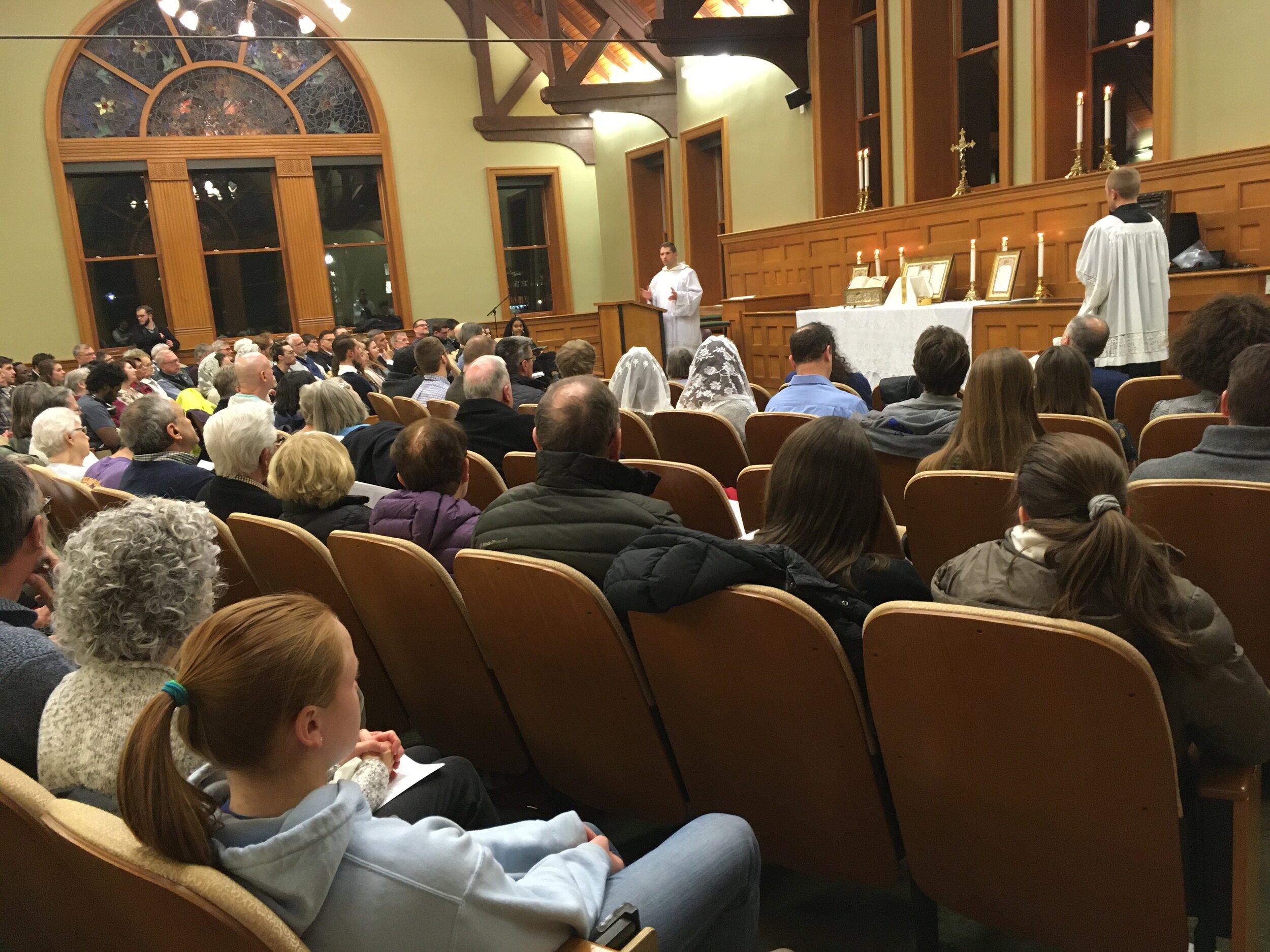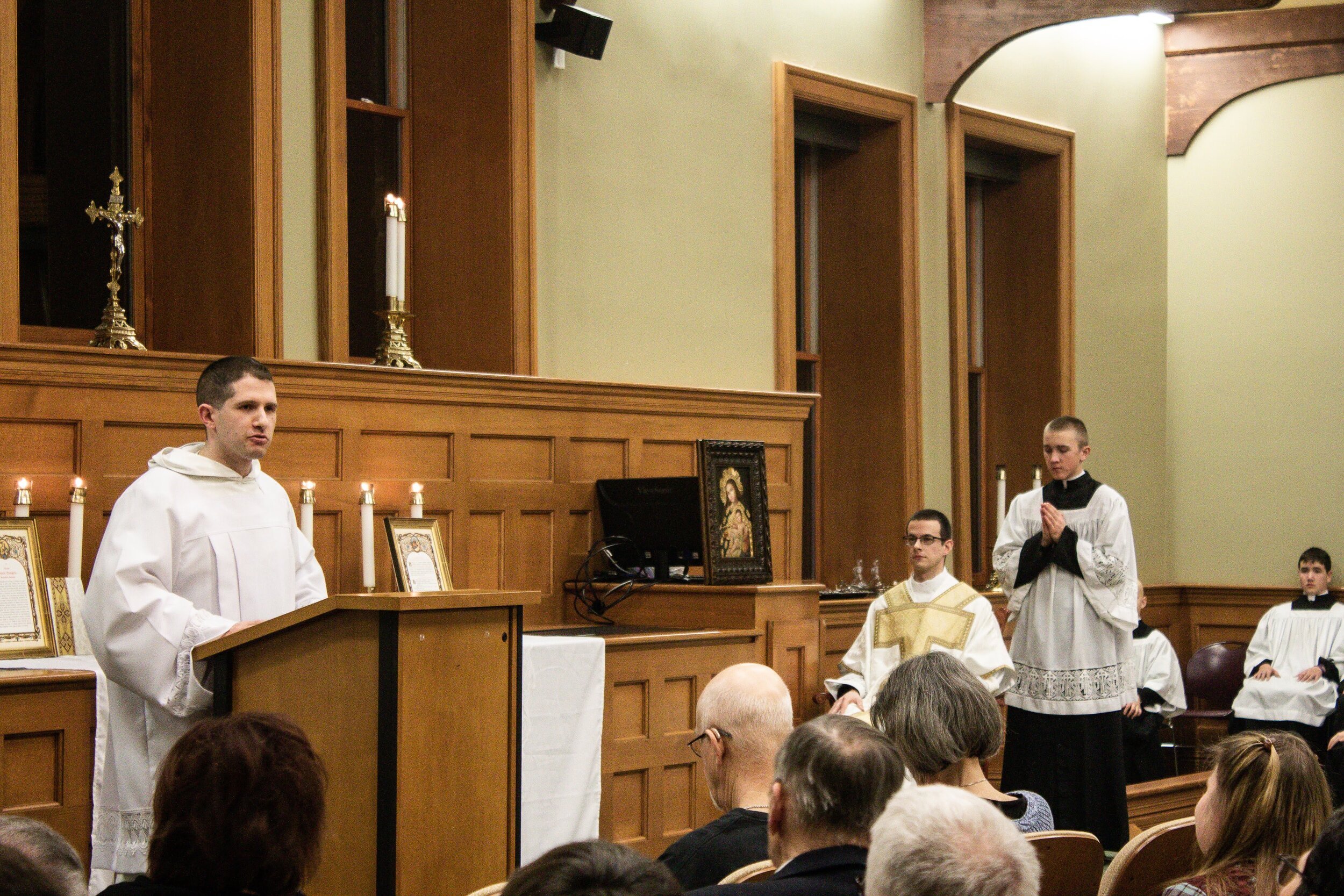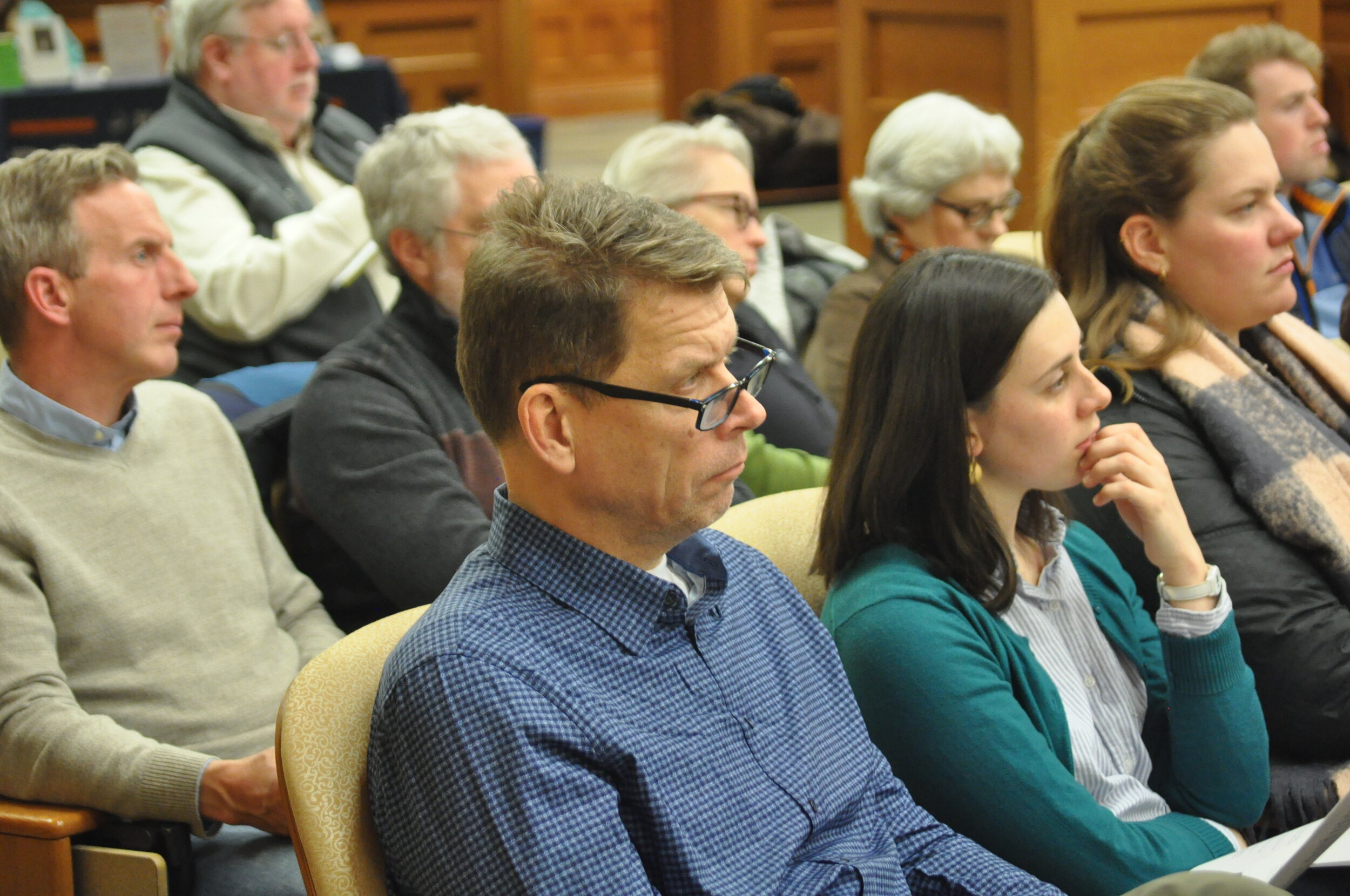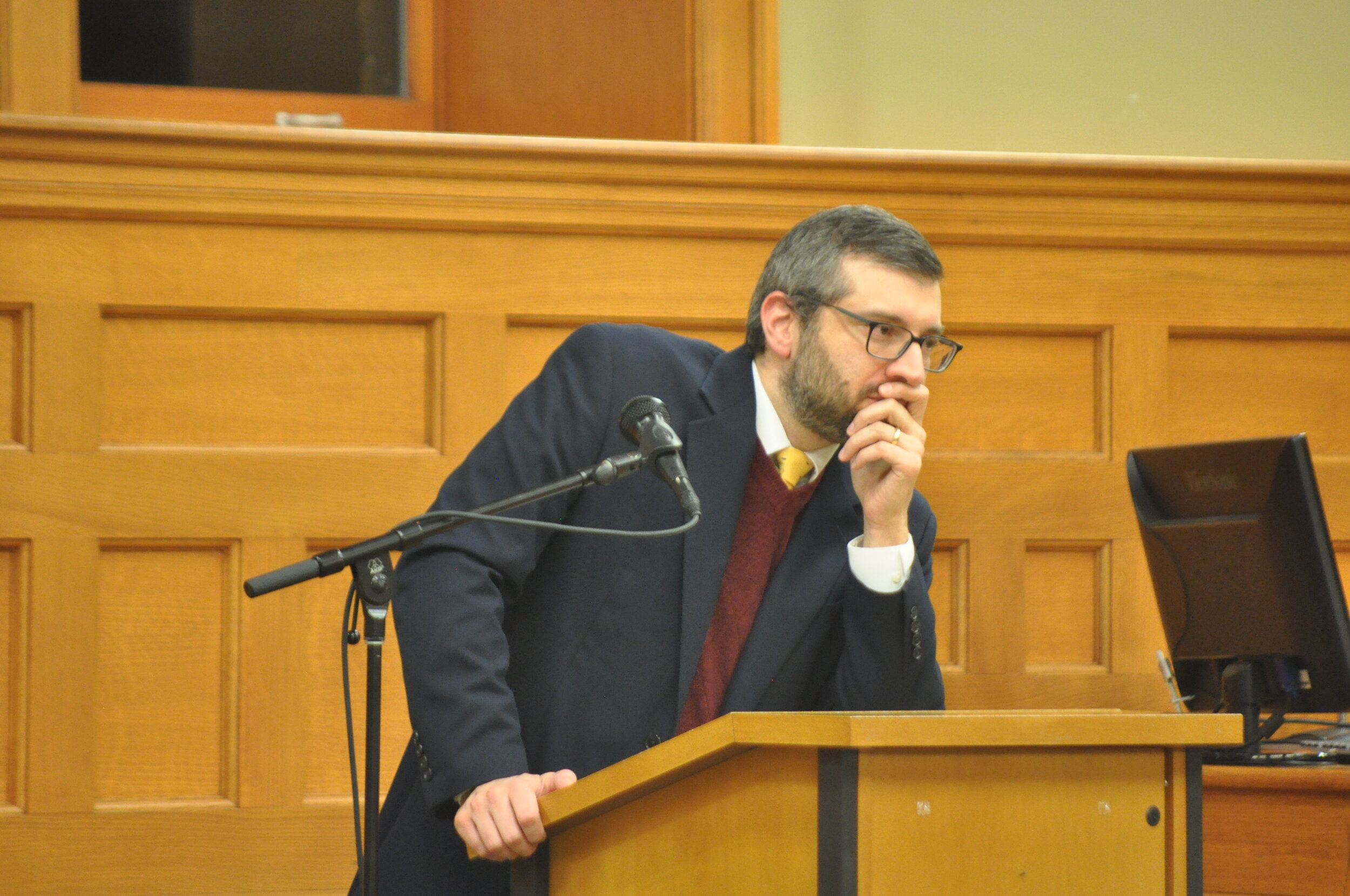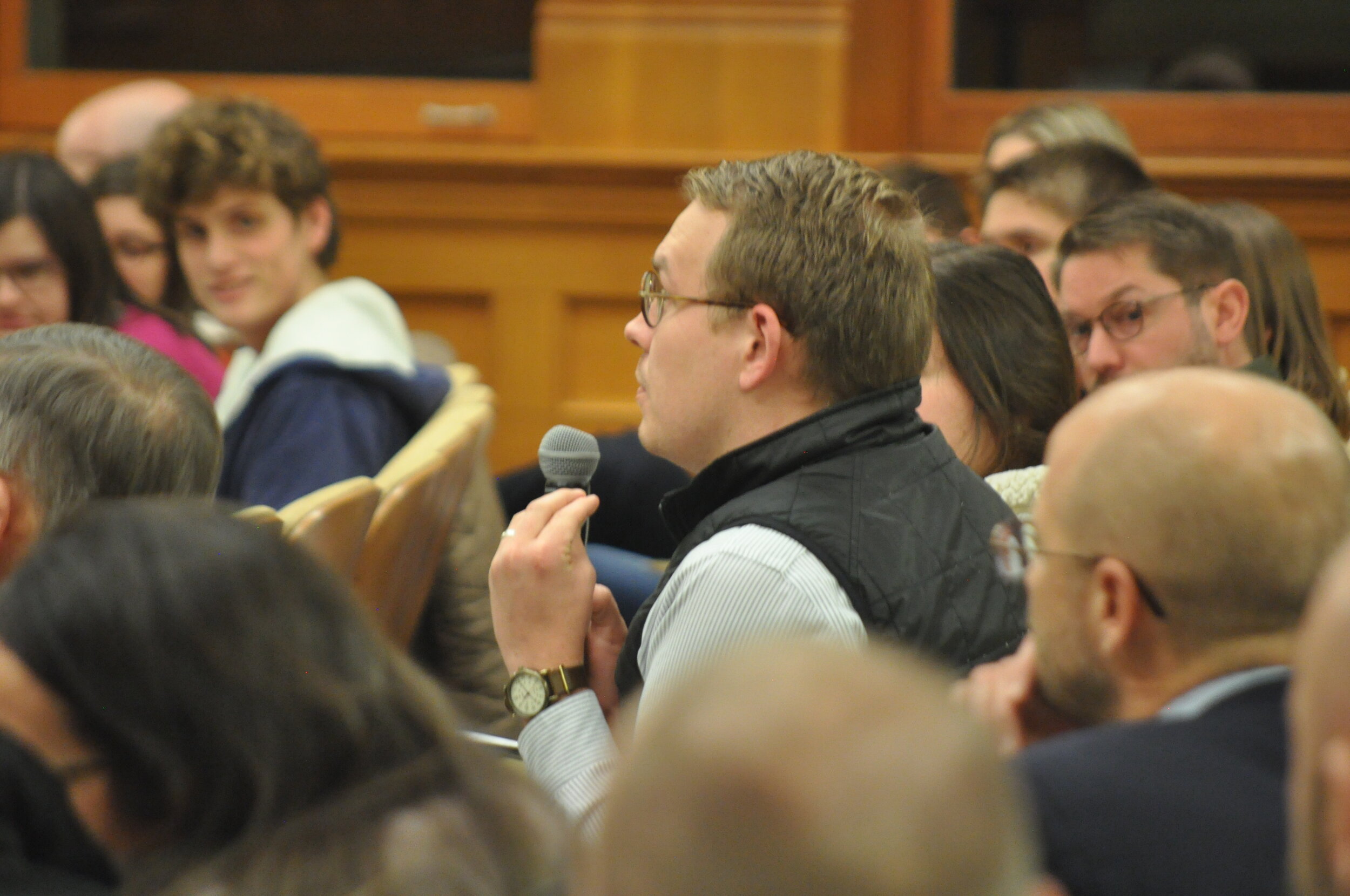How can scripture guide our search for wisdom? Bernard McGinn, professor emeritus in the Divinity School of the University of Chicago, begins the Lumen Christi Institute’s webinar series on Reason and Wisdom in Medieval Christian Thought by presenting on Gregory the Great and reading scripture for wisdom. The Saint Benedict Institute is a cosponsor of this event.
An Augustinian Theology of Mass Incarceration
Thursday, February 27, 2020
7:00PM
Mulder Chapel, Western Theological Seminary
101 E. 13th Street, Holland, MI 49423
On Thursday, February 27, Western Theological Seminary is welcoming Dr. Gregory Lee, who will present a talk on “An Augustinian Theology of Mass Incarceration.” The lecture will be held at 7:00PM in Western Theological Seminary’s Mulder Chapel (101 E. 13th Street, Holland, MI 49423). This event is hosted by the Girod Chair of Western Theological Seminary and the Saint Benedict Institute is a co-sponsor.
The United States incarcerates far more individuals than any nation in the world, at radically disparate rates for different racial groups. This lecture draws on the thought of Augustine to encourage new approaches toward criminal justice. Augustine’s understanding of personal sin stresses the possibility of redemption for individual wrongdoers, and his account of collective evil exposes systemic injustice as a pervasive feature of humanity’s fallen condition. These insights commend Christians’ solidarity with oppressed communities, and the exercise of mercy and restorative practices in response to criminal offenses.
Dr. Gregory Lee is associate professor of theology and urban studies at Wheaton College and a core faculty member for Wheaton in Chicago, a residential program in the Woodlawn neighborhood of Chicago. His scholarship draws on Augustine’s theology to analyze contemporary social issues, focusing especially on race, class, and justice. He lives with his family in the inner city of Chicago, where he is theologian in residence at Lawndale Christian Community Church.
This event is co-sponsored by the Girod Chair of Western Theological Seminary, the Hope-Western Prison Education Program, and the Saint Benedict Institute.
Taking Advantage of Freedom: What to Do with Liberty When You Have It [PHOTOS & VIDEO]
On Monday, February 17th at 7:00PM, Dr. David Deavel presented his talk, "Taking Advantage of Freedom: What to Do with Liberty When You Have It” in Winants Auditorium (Graves Hall, 263 College Ave., Holland, MI 49423). This event was co-hosted by Markets & Morality and the Saint Benedict Institute.
While political, economic, and intellectual freedom is a precious gift to humans, our long history shows that we are ready to give it away. Why is that? One answer might be given from the Nobel-Prize-winning Russian writer, Aleksandr Solzhenitsyn (1918-2008): when people don’t understand and use the freedom they have, they will throw it away to the detriment of themselves and their loved ones. This lecture will give a brief introduction to the life and career of Solzhenitsyn and then outline four enemies of freedom along with the way to defeat them. The goal is to take advantage of freedom in order to preserve it and flourish as individuals and societies.






David Paul Deavel, Ph.D. is editor of Logos: A Journal of Catholic Thought and Culture and a visiting assistant professor at the University of St. Thomas. His Ph.D. is in historical theology from Fordham University. The 2013 winner of the Novak Prize, his book, Solzhenitsyn and American Culture: The Russian Soul in the West, co-edited with Jessica Hooten Wilson, is forthcoming this fall. He is a senior contributor at The Imaginative Conservative and has written over 300 articles and reviews in a wide variety of books and popular and scholarly journals including: America, First Things, Journal of Markets & Morality, Library of Law and Liberty, National Review, Nova et Vetera, and the Wall Street Journal.
Co-sponsors for this event include Hope College’s departments of History, Political Science, and Religion, and the Tocqueville Forum.
Traditional Latin Mass [PHOTOS]
On Wednesday, January 29th at 7:30PM, the Saint Benedict Institute hosted a Traditional Latin Mass in Winants Auditorium (Graves Hall, 263 College Ave., Holland, MI 49423) commemorating the Feast of Saint Francis de Sales, the patron saint of our parish in Holland. The Mass was sung by Gaudete Grand Rapids, a brand new professional choral ensemble dedicated to propagating the beautiful chant and polyphony of the Roman Rite. They sang the Mass for Four Voices by William Byrd, motets by Anton Bruckner and Maurice Duruflé, as well as Gregorian chant.
This event was free and open to the public.
Gaudete Grand Rapids is a small, professional choral ensemble dedicated to performing perennial Latin liturgical music in the context for which it was written, the Traditional Latin Mass. Director Jonathan Bading ('18) converted to the Catholic faith upon witnessing the Traditional Latin Mass in all its musical splendor, his main impetus for founding Gaudete. While now a choir of 12, their five founding members recorded a promotional album, Woman, Behold Thy Son, which can be purchased at gaudetegr.bandcamp.com (digital and CD) or following Mass. All funds will go towards supporting their first season, of which this Mass is the inaugural event.
Jonathan Bading recently shared his conversion story on the Journey Home. You can watch his beautiful testimony here.
Co-sponsors of this event included the Departments of Music and Religion at Hope College.
Exodus 90
Exodus 90
Start Date: January 29, 2020 (Registration closes January 26)
End Date: April 26, 2020
The Exodus 90 program is built on the pillars of fellowship, prayer, and sacrifice. It is for those who are looking to seriously live their faith, to encounter Christ in a new way, and to overcome sinful habits. The program is demanding and that is point. To make room for Christ in our hearts requires clearing other things out. If you register for this program please know that it is a serious commitment to a weekly group meeting, to daily accountability, at least 20 minutes of daily prayer and a serious regimen of ascetic practices. If you are not interested then please do not sign up. If you do then give it your all, knowing that Jesus will not be outdone in generosity. Anyone is welcome to participate.
How To Register:
Watch the intro video below and read the list of the Exodus 90 sacrifices.
Fill out the registration form below. REGISTRATION CLOSES JANUARY 26.
Sign up for a group.
Email exodus90@hope.edu if you have any questions.
Turning Worshipers into Gods: Liturgy and Salvation in the Early Church [PHOTOS + VIDEO]
On Thursday, January 16, the Saint Benedict Institute founder and executive director, Dr. Jared Ortiz, stepped up to the podium. He spoke on “Turning Worshipers into Gods: Liturgy and Salvation in the Early Church.”
What is worship and what is it for? What is salvation and what does worship have to do with it? In this talk, Jared Ortiz, associate professor of religion at Hope College, will address these questions by examining the prayers and rituals of the early Christian baptism liturgy. In these rituals, early Christians understood that they were entering into Paradise, given a foretaste of the true Promised Land (heaven!), and were "being filled with all the fullness of God" (Eph. 3:19). They prayed that they might "become partakers of the divine nature" (2 Pet. 1:4). In short, the early Church believed that through their worship they could become divine. Dr. Ortiz's reflections will be drawn from his recent volume Deification in the Latin Patristic Tradition (Washington D.C.: The Catholic University of America Press, 2019). The Catholic World Report published this interview with his comments on his latest book and the subject of this talk.
Dr. Jared Ortiz is associate professor of religion at Hope College, author of You Made Us for Yourself: Creation in St Augustine’s Confessions (Fortress Press, 2016), and editor of Deification in the Latin Patristic Tradition (The Catholic University of America Press, 2019). He is also founder and executive director of the Saint Benedict Institute.
Student Stories: Digging Deeper
This is the first time in my life that I have been able to go to Mass each day and doing so has impacted my life in such a profound way.
Student Stories: Praying Lectio Divina
Lectio Divina is the convergence of two core practices of Christianity that I had not directly associated before: reading the Bible and prayer.
Student Stories: A Sacramental Rhythm
Rachel Tishkoff: A Sacramental Rhythm
During my time in college, I have come to have a greater awareness of the power of participating in the sacraments often and the meaning that this has for my spiritual life. Attending Mass throughout the week and going to confession on a regular basis provides a rhythm to my life and keeps me grounded in peace throughout my week. I feel very fortunate to have so many opportunities to participate in the sacraments here on campus. I typically go to daily Mass a few days a week and it is always refreshing to be able to enter into prayer, hear the Word of God, and receive the Eucharist in the middle of my day. It is also a joy to see the familiar faces of classmates, professors, and friends from the community and to know that we are coming before the Lord together. Going to confession and daily Mass has contributed much to my spiritual growth and I am grateful to have Fr. Nick on campus to give us these opportunities. It is also a blessing to be a part of a devoted Catholic community here at Hope and to be able to share in this aspect of living out our faith.
Rachel is a senior from Ann Arbor. She is studying education and plans to student teach in Denver, CO this spring. She hopes to create 'The Great American Catholic Cross-Country Road Trip,' a guidebook highlighting important Catholic sites across the U.S.
The Authority of the Sacred Victim: Why Our Identity Politics Are So Contentious
Thursday, November 21
7:00PM
Winants Auditorium, Graves Hall
On Thursday, November 21, Dr. Molly Brigid McGrath will present a lecture with the title, “The Authority of the Sacred Victim: Why Our Identity Politics Are So Contentious.” The Tocqueville Forum will host the event; the Saint Benedict Institute is a co-sponsor.
There is something sacred about suffering. This helps to explain the rise and intensity of our current fascination with "identity politics." One way we can understand “identity politics” is by noticing the way people talk and the roles they are given when discussing oppressed groups. People in these groups are forced to symbolize their demographic categories, and members of oppressed categories are granted a special status rooted in the sacredness of their groups. Thus, identity within certain groups gives one a sacred status while those outside are considered profane and even evil if they do not render proper homage to those within.
Understanding the sacred character of the victim in our current identity politics will help us address a number of confusing phenomena in our culture: Why was groundbreaking lesbian tennis champ Martina Navratilova booted by an LGBT athletics group? Why did Jussie Smollett want people to think he’s a hate-crime victim? Why did Rachel Dolezal want people to think she’s black? What type of authority or expertise do trans* activists have when speaking about the nature of sex and gender?
Dr. Molly Brigid McGrath is Director of the Honors Program and Associate Professor of Philosophy at Assumption College in Worcester, Massachusetts. She focuses on Husserlian phenomenology, Aristotle, social ontology and also enjoys writing philosophical movie reviews.
Courtship, Marriage, and Sex: The What, Where, When, and How
Courtship, Marriage, and Sex: The What, Where, When, and How
Friday November 8, 15, 22
5:00PM - 7:00PM
Herrick Room (Dewitt 2nd Floor)
Students Only
The Saint Benedict Institute invites students to participate in three-week seminars about various questions and issues related to the Catholic faith. Led by Catholic professors, professionals, and priests, the purpose of these seminars is to facilitate the intellectual life of students and cultivate friendships on campus. Students meet weekly for a warm meal, a short lecture, and a long discussion in an event that feeds both body and soul.
In today's society, there is very little instruction about how to navigate the world of love and romance. In this three-week Saint Benedict Seminar, current students were given theological and practical wisdom on courtship, marriage, and sex.
Week 1: “What is Courtship?” with Jared and Rhonda Ortiz
Week 2: “Marriage, Sex, and Theology of the Body” with Jack and Melissa Mulder
Week 3: “How We Met and How We Knew We Wanted to Get Married” with Nate and Kellie Dubravec, Josh and Julia Kraut, and Bram and Maggie TenBarge
We asked one of the students who attended Week 1 to write about her experience; her reflection is below.
Courtship
By Abby Nickles
It’s Friday night, classes are done for the week, and it is time to let loose, have fun, and go out with my boyfriend… to a seminar on courtship, marriage, and sex as taught by the Catholic Church. Many peers would wonder why something like that would be worth my while, but as expected, the Saint Benedict Institute and their excellent presenters did not disappoint. The Saint Benedict Institute hosted a three-part seminar and dinner series titled “Courtship, Marriage, and Sex: The What, Where, When, and How,” during the month of November. The goal of this series was to provide some instruction on how to navigate the world of love and romance by bringing guest speakers. These speakers were devout Christian couples who graciously agreed to give up their Friday evenings to share wisdom with young adults in need.
The first night was titled, “What is Courtship?” and lead by Dr. Jared Ortiz and Rhonda Ortiz. They described courtship as a “script that prepares for life together” and that through proper courtship, as opposed to the vague and undefined “relationships” that exist in today’s world, couples can practice the friendship and mutual giving that is essential in marriage and family life. For men, courtship is the turning of his desires from lust into love. Being able to turn away from lust allows them to discern whether the woman he is pursuing will make a good wife and mother. Women in courting relationships need to learn if the man is worthy of esteem, if he will make a good husband and father.
One of the biggest challenges of courtship is maintaining chastity, especially because there is often an ignorance of the other sex, and it is important that we do not ignore the basic biology. When women make love, they release oxytocin (this is also released during birth and nursing). This is a bonding hormone, which means that women bond to their spouse in the same way they bond to their children, and so they feel this bonding on a different level than men, who’s testosterone release covers up the oxytocin that they also release during love making. This is one of the reasons why women typically take the lead on chastity, because it is simply self-preservation. Men get excited much quicker than women, so it is an act of charity for women to practice more self-control. Men have the responsibility of being honest about what excites them, so the couple can avoid placing themselves in a situation that one of them could be tempted. Men bond in making the decision to commit and by showing the woman self-sacrificing love, proving that the love is not only in the passion.
Chastity teaches us to stay secure in God’s love first. It helps us keep an eternal horizon, understanding that our future spouse will never truly satisfy us like God does. In light of this, here are some practical rules provided by Dr. and Mrs. Ortiz,
Basic Rules (that articulate what will truly make us happy):
No Sex
Kind of obvious, but note that this means no sex of any kind, with any part of the body
No French Kissing
“Guys can’t French kiss without their mind exploding” -Dr. Jared Ortiz
Don’t Sit on the Couch Together
Be in Public Places Together
Do Things
Take Time to Talk with Each Other
Do Things in Groups
Meet Family Early
Watch how they interact with each other
We have a deep longing to live a life that is worth living, and that is found in marriage and family, courtship is a way to practice for this, and to practice getting each other into heaven, because that is the ultimate goal of marriage. In the words of Dr. Ortiz, “It is better not to sit on the couch together for a while than get in the way of the other getting into heaven.”
This talk has been very helpful in my relationship. We have been dating for almost two years, but this seminar gave us a common language to be able to talk through some of the things we had been struggling with. It outlined what the goal of our time together now should be, and gave us a good idea of how this will help us in the future. The practical rules are very helpful, and lately we have been putting more emphasis on spending intentional time together talking about life, deepening our friendship, pointing each other towards God, and keeping our eyes on that eternal horizon. I am very thankful to the Saint Benedict institute for treating us to this wonderful event.
Stephen Barr: Science and Religion: The Myth of Conflict [PHOTOS + VIDEO]
Science and Religion: The Myth of Conflict
Over 200 people crammed into Winants Auditorium on the evening of October 24, 2019 to attend the lecture of Professor Stephen Barr. The lecture was called Science and Religion: the Myth of Conflict, and Barr, not only a professor in the Department of Physics and Astronomy of the University of Delaware, but also the founding president of the Society of Catholic Scientists, was uniquely suited to speak on the topic.
He began by speaking about materialism. Materialism, he said, says that all reality is reducible to matter and its behavior, and because of this, science itself can often get conflated with scientific materialism, adding into that myth that science and religion are incompatible. This is because, Barr explained, through materialism God could not exist because God, being non-material, isn’t matter. He called scientific materialism an ideology, like Communism or atheism. The goal is to “free” the human mind of all irrationality and delusion—which, of course, to the scientific materialist, especially includes religion.
He confronted the idea that God cannot exist, merely because we can’t see Him. Some people, he said, argue that the universe and all of its beauties exist by random events, and it just happened to be so perfectly ordered. Barr explained why that was not necessarily true using this example: if you enter a house and see that everything is neat and orderly, well-tended and well-decorated, you don’t assume that the house just exists in that state by mere happenstance, but because someone is taking care of it. The same is true, he elaborated, for providence, law, and order. In fact, Barr argued, for there to even be laws we all agree on, there must be someone who gave those laws in the first place. Practically all people can agree that cruelty against animals is wrong, is evil, even. However, in a universe ordered by some great cosmic accident, there is no reason for that to be wrong. This is also why miracles surprise us—in a random universe, nothing would dictate that they couldn’t happen all the time. Miracles presuppose that there are laws that can be broken. God can override the laws of the universe because He is the author of them. Further, if anything about the universe were even slightly different in the laws of physics, life on earth could not be possible, remarking that if the bonds between protons and neutrons were even a little weaker, it would spell catastrophe.
Barr also highlighted some especially noteworthy Catholic priests who also happened to be scientists. Notable names included Gregor Mendel, father of modern genetics; Francesco Grimaldi, the man who discovered the diffraction of light; Giuseppe Piazzi, who discovered the first dwarf planet; and Georges Lemaitre, founder of the Big Bang Theory. Barr drew attention to this in part, of course, to highlight and celebrate the accomplishments of these men, but more than that, he illustrated how fake the divide between religion and science is. These men founded much of modern science as we know it, while being Catholic priests. Catholicism is not anti-science; Catholicism is in modern science’s DNA.
This event was co-sponsored by the Corpus Christi Foundation, Campus Ministries, the Offices of Arts and Humanities and Natural and Applied Sciences, and the departments of Geological and Environmental Studies, Neuroscience, Philosophy, Physics, Social Sciences, and Religion.

![Gregory the Great on Reading Scripture for Wisdom [VIDEO]](https://images.squarespace-cdn.com/content/v1/577d3bb79de4bbf977f473cc/1585791822396-U3B57KLH9R8IGEIODMR8/Francisco_de_Goya_-_Saint_Gregory_the_Great%2C_Pope_-_Google_Art_Project.jpeg)






